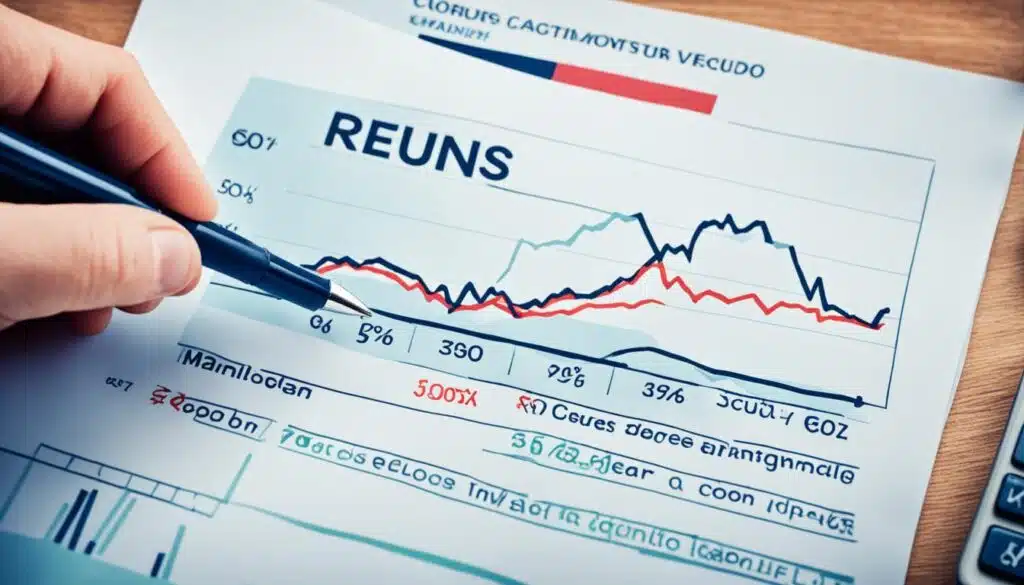Investing wisely in the UK is key to your financial success. In this piece, we will look at the best ways to invest money. We’ll cover everything from saving for a rainy day to planning for retirement.
It’s all about having a plan and making smart choices. Keeping costs low is also important. This way, you ensure a bright financial future.
Key Takeaways
- Prioritise building an emergency fund before investing
- Contribute to employer-sponsored retirement plans to maximise benefits
- Explore low-risk options like certificates of deposit and treasury bills
- Invest in exchange-traded funds (ETFs) for diversification
- Rebalance your portfolio regularly to maintain your risk profile
Begin Small and Steadily Increase Your Investments
Starting your investment journey is not scary. Start with a small amount and then increase it over time. This way, you build up your savings little by little. You’ll gain the confidence to watch them grow.
Automatic Savings Apps
Apps for automatic saving have changed the game. With tools like Acorns, Qapital, and Chime, you can invest little by little. You can do this by setting up regular transfers, saving bits from your purchases, or a set part of your income. This makes it easy to start small and see your money grow without much effort.
Deal With Your Debts First
Before you invest, deal with any high-interest debt. It’s vital to pay off things like credit cards with high interest first. The money you save from not paying high interest can be more than what you earn from investments. Focus on fixing your debts before building your investment portfolio.
Starting with small investments is key. Use saving apps and get rid of high-interest debt first. This sets you up well for your future financially.
Also Read :What Are The Best Ways To Earn Money From Home?
Prioritise Retirement Savings
Save for retirement early and often. Make it a top priority in managing your money. Put money into accounts like 401(k)s and IRAs to grow your savings quickly. This will help secure a good financial life later on.
Contribute to Employer-Sponsored Plans
If you can, use pension schemes set up by your work. They often match what you add, giving you extra cash. Make sure you put in enough to get this full match. It can really help maximise retirement contributions.
| Retirement Savings Option | Key Benefits |
|---|---|
| 401(k) Plans | Tax-deferred growth, potential employer matching contributions, wide range of investment options |
| Individual Retirement Accounts (IRAs) | Tax-advantaged savings, flexibility in investment choices, ability to contribute even if you have a 401(k) |
| Defined Benefit Pension Plans | Guaranteed lifetime income in retirement, no investment risk for the employee |
Signing up for workplace pension plans offers tax perks and more money through matching. It’s a great way to boost your retirement savings uk. This path leads to a more certain financial future.
“The greatest wealth is to live content with little, for there is never want where the mind is satisfied.” – Lucretius
Also Read :How Should I Start Investing Money?
Invest Your Tax Refund

If you get a tax refund in the UK, think about investing it. Instead of spending this extra cash, use it to start an investment. This way, you won’t need to touch your usual money. Plus, you might grow your wealth over time.
Putting your tax refund towards future financial targets is a smart move. You could use it for your pension, save for unexpected times, or mix up your investment choices. This lets you benefit from compound interest and potentially increases your funds.
If you’re not sure how to turn your tax refund into investments, get advice. A finance expert can create a plan that fits your comfort with risk, how long you are planning to invest, and your goals.
| Investment Option | Potential Benefits | Risks |
|---|---|---|
| Stocks | Potential for long-term growth | Volatility and market risk |
| Bonds | Steady income and lower risk | Interest rate risk and inflation risk |
| Mutual Funds | Diversification and professional management | Fees and expenses |
Investing your tax refund makes sense for your financial future. Take some time to look into the best options and spread your investments wisely. This approach can help you reach your long-term money goals.
Also Read :What Are The Best Strategies For Real Estate Investing?
Minimise Investment Fees

Reducing investment fees is vital when you’re investing. Big fees can eat into your profits, especially for smaller investments. Choose low-cost investments carefully to make more money work for you.
To reduce investment fees UK, try focusing on index funds that are managed passively. These funds follow big market indexes like the FTSE 100 or S&P 500. They usually charge lower fees than funds that are managed actively. So, skipping these high active management costs can help you manage investment costs better.
- Look for exchange-traded funds (ETFs) and index-tracking funds with expense ratios below 0.50%.
- Invest in low-cost online platforms as they have many affordable options.
- Stay away from products with high commissions, like some annuities and variable life policies. They could lower your gains.
| Investment Option | Average Expense Ratio | Potential Impact on Returns |
|---|---|---|
| Actively Managed Fund | 1.25% | Can reduce long-term returns by 25% or more |
| Passively Managed Index Fund | 0.20% | Minimises drag on long-term returns |
| Online Investment Platform | 0.25% – 0.50% | Offers low-cost access to diversified investments |
“Minimising investment fees is key to boosting your returns over time. Even slight drops in fees can greatly increase your wealth in the long run.”
Keep an eye on investment fees and choose low-cost options. By doing this, you’ll be able to manage investment costs better. Plus, you can grow your portfolio significantly over time. It’s a simple but very effective way to secure your financial future.
Also Read : What Are The Most Effective Long-term Investment Strategies?
Invest in Short-Term, Low-Risk Options with Small Amounts

Starting with a little money? Think about low-risk, short-term investments. two great choices for small investments are certificates of deposit (CDs) and Treasury bills (T-bills) in the UK.
Certificates of Deposit and Treasury Bills
CDs and T-bills are low-risk, short-term ways to grow your money. CDs come from banks. They have a fixed rate and end date. T-bills, on the other hand, are from the UK government.
Here are the main perks for small investors:
- Low-risk: Both CDs and T-bills are stable, with backing from banks and the UK’s government.
- Steady returns: They give fixed, reliable incomes, perfect for those who want a sure thing.
- Buy with little: You can get started with as little as £1,000 or less.
Dividend Reinvestment Plans
Have a bit to invest? A dividend reinvestment plan (DRIP) can be smart. It lets you put your stock dividends back into buying more shares of the same company. This comes with no brokerage fees.
DRIPs are good for these reasons:
- Grow your wealth: Reinvested dividends help your investment grow over time due to compounding.
- No extra costs: DRIPs don’t charge fees, keeping your investment costs down.
- Many choices: With lots of DRIP companies, you can slowly grow a diverse selection of dividend stocks.
Looking into investments with small funds? Think about CDs, T-bills, and DRIPs. These options are great for starting out and can lead to more complex financial moves later.
Also Read :How Do I Create A Personalized Financial Plan?
Explore Exchange-Traded Funds (ETFs) for Diversification

When investing, diversification is crucial. Exchange-traded funds (ETFs) are great for achieving this, even with a small amount of money. ETFs are like a bucket of different investments that track specific parts of the market or sector.
Using etfs for diversification uk is wise for both new and experienced investors. They need less money upfront than buying individual stocks or mutual funds. This makes them perfect for anyone who’s just getting into investing or has a small budget.
The Benefits of Investing in ETFs
- Diversification: ETFs spread your risk by investing in many different areas.
- Low Costs: They often cost less than other types of funds, saving you money.
- Flexibility: You can buy and sell ETFs almost any time of day.
Before you invest in etfs, make sure you know the different choices. You have index ETFs, which follow a market index, and sector ETFs, that look at one industry or part of the economy.
| ETF Type | Description | Example |
|---|---|---|
| Index ETF | Tracks a broad market index like the FTSE 100 or S&P 500 | iShares Core FTSE 100 UCITS ETF |
| Sector ETF | Focuses on a specific industry or sector, such as technology or healthcare | Invesco FTSE RAFI UK 100 UCITS ETF |
Choosing investing in etfs that meet your goals helps in building a strong portfolio. Always research, be aware of the risks, and consider financial advice if necessary for any investment.
“Diversification is the only free lunch in investing.” – Harry Markowitz, Nobel Laureate in Economics
Consider Peer-to-Peer Lending and Crowdfunding

Peer-to-peer lending and crowdfunding are becoming popular investment choices in the UK. They give investors a chance to support people directly with their money. This can offer better returns than the usual savings accounts or bonds.
Through lending UK platforms like Zopa and Ratesetter, people can give money to borrowers. This can happen at good interest rates. On the other hand, crowdfunding investments UK let investors fund projects or businesses they like. These investors might gain from the project’s success or get a share of the profits.
But, these investments come with risks. In peer-to-peer lending or crowdfunding, you might not get your money back. It’s vital to research each opportunity carefully. Different platforms and investments come with varying levels of risk and rewards.
| Peer-to-Peer Lending UK | Crowdfunding Investments UK |
|---|---|
| Connect investors directly with borrowers | Connect investors with entrepreneurs or projects seeking funding |
| Potential for higher returns compared to traditional savings accounts | Potential for equity gains or revenue sharing in successful projects |
| Risks include non-repayment of loans | Risks include the failure of funded projects or businesses |
In the end, think of peer-to-peer lending and crowdfunding as part of a diverse investment mix. Knowing the risks and your own tolerance for them is key. With the right approach, these options might boost your investment outcomes.
Best Ways To Invest Money with $1,000 or More
If you have £1,000 or more to invest, look into target-date funds. These funds change how they invest as you get closer to your retirement. They are great for anyone wanting to invest for the long term. This is especially true when you have invest 1000 pounds uk.
Target-date funds are easy to handle for people putting away money for when they stop working. They start off being more risky with their investments, then they become safer over time.
Target-Date Funds
Why are target-date funds uk a good idea?
- They change how they invest to lower risk as retirement nears.
- They spread your money across stocks, bonds, and more to keep risk down.
- This means you don’t have to keep an eye on your investments. The fund does it for you.
- They usually cost less than funds where someone actively picks where to put your money.
When you’re investing £1,000 or more, these funds can be a great choice. You get to sit back while the fund keeps your money in the right places. This lets you concentrate on adding more to your retirement savings.
| Fund Name | Retirement Year | Expense Ratio |
|---|---|---|
| Vanguard Target Retirement 2045 Fund | 2045 | 0.22% |
| Fidelity Freedom Index 2050 Fund | 2050 | 0.12% |
| LGIM Future World Multi-Index Fund IV | 2055 | 0.35% |
If you have more than £1,000, using target-date funds is a wise choice. It’s an easy and smart way to make a retirement fund. And the best part? It doesn’t require you to do much.
Rebalance Your Portfolio Regularly

It’s key to check and adjust your investments every 1-2 years as they grow. This keeps your mix of assets in line with your goals and risk levels. It also helps you keep gains from investments that have done well.
Regularly rebalancing your investment portfolio UK keeps your money spread out smartly. It means changing how much of your money is in things like stocks, bonds, and cash. You do this to keep your investments close to what you originally planned. Sometimes, if you don’t check, your investments can change a lot, moving away from what you wanted.
Checking how your money is divided up lets you see if things need to be adjusted. This helps lower your risk and make use of good and bad times in the markets. You can also get more from the investments that are doing better.
To rebalance your portfolio, you can follow these steps:
- Determine your target asset allocation based on your investment objectives, risk tolerance, and time horizon.
- Monitor your portfolio regularly and identify any significant drifts from your target allocation.
- Decide on the appropriate rebalancing actions, such as selling overweight assets and buying underweight ones.
- Implement the rebalancing strategy, ensuring you minimise transaction costs and tax implications.
It’s good to keep rebalancing your investments in a careful way. This can help you meet your long-term financial plans and deal better with the market moving up and down.
“Rebalancing your portfolio is like a regular tune-up for your car – it helps keep your investments running smoothly and efficiently.”
| Benefit | Description |
|---|---|
| Risk Management | Rebalancing helps maintain your desired risk profile by bringing the portfolio back to its target asset allocation. |
| Capture Gains | Rebalancing allows you to sell portions of outperforming asset classes and reinvest the proceeds in underperforming ones, potentially locking in gains. |
| Discipline | Rebalancing enforces a disciplined approach to investing, preventing emotional decision-making and ensuring a consistent investment strategy. |
Shift Focus to Large-Cap Stocks

Mid-cap and small-cap stocks have done well recently. It might be time for investors to look more at large-cap stocks. Large-cap companies are those worth £10 billion or more. They are usually more stable and have better valuations than smaller ones. This makes them a good choice for those wanting to balance their portfolio.
Large-cap large-cap stocks uk are big, strong companies with a good history. They lead in their industries, have strong brands, and can handle tough times. Their strong position makes them a good pick for older investors or those who prefer less risk.
Investing in large-cap stocks also means more security when markets are unsure. They might not grow as fast as small companies, but they can pay steady dividends. This is great for anyone wanting to invest in large companies for a mix of safety and growth.
Choosing the right large-cap stocks is key. Look for companies with solid finances, steady earnings, and a leading position in their field. Picking these companies might bring both stability and growth to your investments.
“Large-cap stocks can provide a sense of security during times of market volatility, offering a more reliable stream of dividends and a smoother ride for investors.”
Deciding to focus more on large-cap stocks depends on your goals and how much risk you’re okay with. Think about what these companies can add to your investment mix. With the right research, you can pick ones that fit well with your financial plans.
Invest in Infrastructure Sector Stocks and Funds

The UK’s infrastructure sector is set for big growth. This is thanks to heavy government spending on roads, railways, and cities. By investing in infrastructure stocks and funds, you can join in on the action.
This sector is expected to grow further. It gets a lot of money from the government and has many construction projects lined up. This means it’s a good area to put your money in.
One great thing about investing here is the steady returns you might get. Infrastructure projects often have long contracts and regular money. This makes them not as affected by sudden changes in the market.
The sector’s demand for ongoing work and upgrades is another plus. It means there are always new projects and chances for infrastructure companies to do well.
Infrastructure Stocks in the UK
There are many UK companies in infrastructure that you can invest in. Some top ones are:
- Balfour Beatty plc (LON: BBY): A big UK construction company working on roads, rail, and power projects.
- Kier Group plc (LON: KIE): This company does lots of different things in infrastructure. They work in transport, utilities, and housing.
- Costain Group plc (LON: COST): A major player in engineering and construction, focusing on highways, rail, and water projects.
Infrastructure Funds in the UK
Investors can also put money in infrastructure through funds. Infrastructure funds spread out your money across different projects. This helps manage risk better.
Some well-known infrastructure funds in the UK are:
- HICL Infrastructure Company Limited (LON: HICL): Focuses on infrastructure like hospitals, schools, and transport.
- 3i Infrastructure plc (LON: 3IN): An investment trust looking at renewable energy, transport, and social projects.
- GCP Infrastructure Investments Limited (LON: GCP): Invests in various UK infrastructure projects, especially in social and economic areas.
| Company | Ticker | Sector | Market Cap (GBP) |
|---|---|---|---|
| Balfour Beatty plc | LON: BBY | Construction & Engineering | £2.1 billion |
| Kier Group plc | LON: KIE | Construction & Engineering | £294 million |
| Costain Group plc | LON: COST | Construction & Engineering | £179 million |
| HICL Infrastructure Company Limited | LON: HICL | Infrastructure | £3.2 billion |
| 3i Infrastructure plc | LON: 3IN | Infrastructure | £3.1 billion |
| GCP Infrastructure Investments Limited | LON: GCP | Infrastructure | £1.4 billion |
By putting your money in infrastructure stocks UK and infrastructure funds UK, you join a thriving industry. You could benefit from ongoing government support and the steady income these investments bring.
“Infrastructure investment is crucial for the UK’s economic growth and competitiveness. The government’s commitment to infrastructure development presents significant opportunities for investors in this sector.”
Also Read: Wealth Wisdom: Essential Money Advice For Every Stage Of Life
Conclusion
By following our advice, you can start making smart money moves in the UK. Begin with small investments and grow them slowly. Always save for your retirement and try to reduce the fees you pay. These steps are great for securing your financial future.
Keep disciplined and make your investments varied. Review them regularly to make sure they match your aims. The conclusion investing money uk is to be careful and take advantage of available opportunities for stability.
This summary best ways to invest offers a detailed guide. It’s here to make the investing world less confusing. By following these tips, you can have a brighter and more successful future.
FAQs
How can I start investing money, even with a small amount?
It’s all right to start small with investments. You can begin with just a few hundred pounds. Use apps like Acorns, Qapital, or Chime to save small amounts often.
First, pay off any debt with high interest. This can give you bigger returns than most investments.
Why is saving for retirement a top priority?
Retirement saving should come first. Use special accounts like 401(k)s and IRAs. If your job matches your contributions, this is extra money for you.
How can I make the most of my tax refund?
If you get a tax refund, think about investing it. This money can kick-start your investment savings without hurting your regular budget.
How can I minimise investment fees?
To keep more of your investment earnings, avoid high fees. Look for low-cost investment choices. This helps your money work harder for you.
What are some low-risk, short-term investment options?
Start with safe, short-term options if you’re investing a small amount. Consider CDs or Treasury bills. Dividend reinvestment plans are good too. They let you buy more shares with your dividends.
How can I diversify my investments, even with a small amount?
Try exchange-traded funds (ETFs) to spread your risk, even with little money. ETFs offer a mix of investments. They are good for beginners because many have low minimums.
What are some alternative investment options with higher potential returns?
For those who can take more risk, try peer-to-peer lending or crowdfunding. These options can give higher returns but research well before you invest.
What investment options are best for those with £1,000 or more to invest?
If you have over £1,000, look at target-date funds. They’re good for long-term investing. These funds adjust as you near retirement, making things easier.
How often should I review and rebalance my investment portfolio?
Check and rebalance your investments every 1-2 years as they grow. This keeps your portfolio in line with your goals. It also helps you take advantage of investments that do well.
Should I shift my focus towards large-cap stocks?
It might be a good time to move some attention to large-cap stocks. They offer more stability than smaller stocks. This could balance your portfolio well.
How can I invest in the UK infrastructure sector?
The UK’s infrastructure sector is growing thanks to government investment. Look into infrastructure stocks and funds. They stand to benefit from ongoing government projects and strong orders for building.
Source Links
- https://www.investopedia.com/articles/personal-finance/123115/best-ways-invest-500-5000.asp
- https://m.economictimes.com/wealth/plan/how-to-make-more-money-10-smart-money-moves-to-improve-your-finances-and-grow-wealth-in-2024/articleshow/106396494.cms
- https://www.kiplinger.com/personal-finance/how-to-save-money/smart-money-moves-to-make-right-now









